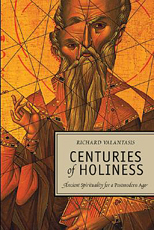"The process of constructing a spirituality has been a serious endeavor in every era of human history. The vast theological and religious literature on the religious life attests to the seriousness of living a life oriented toward God. Play and playfulness did not find much room in the tradition. When reading the biographical tradition and especially the sayings of the desert masters in Egypt, it becomes evident that the monks did play and tease one another, they did enjoy good humor even while struggling to divinize themselves. Despite the seriousness of the objectives and the task of divinization, these monks found time to play.
"Playfulness is an important ingredient in the construction of a postmodern spirituality, and it does not in any way denigrate the serious effort toward divinization of self, society, and the cosmos. Play accomplishes a number of things. First of all, play relieves the tension and tedium of being a seeker focused on divinization. The intensity of being fully aware of the relationship of concrete actions and thoughts to the divinization of self and others creates in the seeker a sense of urgency and devotion that organizes and directs energy and activity. That intensity is not bad, but it should be tempered with times of sheer relaxation and playful inattention to the process of divinization.
"Secondly, in the process of relieving the stress and pressure of divinization, playfulness unbinds the operative categories of the seeker's life and relationships. These categories, molding as they do the structure and content of divinization, hold sway over the life and activity of the seeker to such a degree that they dominate all other categories. Playful interactions loose those categories and enable the seeker to encounter them not in their hegemonic authority, but in their creative and energizing reality. To play within the context of active work toward divinization is to realize that the process is far more expansive than categorical organization allows it to be experienced. Play, then, advances the process of divinization by challenging the primary categories of a seeker's life and thought.
"Thirdly, play creates space for the expansion of the mind. This is a correlative point to the previous one. In challenging the hegemony of even good categories, playfulness creates a mental space for lively exploration of alternative ways of moving toward divinization. Play in this sense functions much like the process of chaos in other parts of the ascetical system. Playfulness opens up the mind and spirit of the seeker to new possibilities, different ways of seeing and experiencing the road to divinization, and other forms of relationships to others in society and to the universe itself. These new ways may alter the direction and focus of the process of divinization.
"Finally, play provides a time for seekers simply to enjoy the fruit of their labor and effort. The work of divinization deserves the seeker's highest efforts; the playful and restful enjoyment of the progress and the effort of the incremental transformation of selves and society, and of the progressive repair of the universe provides the seeker with a new vantage point, which is based in playfulness and relaxation. Divinization ought to be as enjoyable as it is transformative and restorative, and playfulness brings out the joy of efforts well intentioned.
"In structuring a spiritual manner of living and in constructing a spirituality, time for playfulness must be included. It invokes the rest and the play of the seventh day, the sabbath, the day of rest in the midst of creative and serious labor. It invokes the holy fools whose playfulness provided a serious criticism of the dominant religious categories, practices, and theologies. And it invokes the need, particularly in a postmodern setting, to step out of the continuous onslaught of information and knowledge in order to enjoy the fruit of one's labor. Seekers ought not to be seduced by the seriousness of the divinizing project into thinking that all of living must be intentional and directed. Playfulness interrupts the process and offers a fresh view precisely to allow seekers to experience joy and relaxation and perhaps to redirect the effort. Playfulness, like chaos, is a holy tool of the seeker's gradual divinization."
